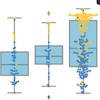 Field assessment of BinaxNOW antigen tests as COVID-19 treatment entry point at a community testing site in San Francisco during evolving omicron surges
Field assessment of BinaxNOW antigen tests as COVID-19 treatment entry point at a community testing site in San Francisco during evolving omicron surgesJohn Schrom, Carina Marquez, Chung-Yu Wang, Aditi Saxena, Anthea M. Mitchell, Salu Ribeiro, Genay Pilarowski, Robert Nakamura, Susana Rojas, Douglas Black, Maria G. Contreras Oseguera, Edgar Castellanos Diaz, Joselin Payan, Susy Rojas, Diane Jones, Valerie Tulier-Laiwa, Aleks Zavaleta, Jacqueline Martinez, Gabriel Chamie, Carol Glaser, Kathy Jacobson, Maya Petersen, Joseph DeRisi, Diane V. Havlir
PLOS One, 2023Abstract: COVID-19 oral treatments require initiation within 5 days of symptom onset. Although antigen tests are less sensitive than RT-PCR, rapid results could facilitate entry to treatment. We collected anterior nasal swabs for BinaxNOW and RT-PCR testing and clinical data at a walk-up, community site in San Francisco, California between January and June 2022. SARS-CoV-2 genomic sequences were generated from positive samples and classified according to subtype and variant. Monte Carlo simulations were conducted to estimate the expected proportion of SARS-CoV-2 infected persons who would have been diagnosed within 5 days of symptom onset using RT-PCR versus BinaxNOW testing. Among 25,309 persons tested with BinaxNOW, 2,799 had concomitant RT-PCR. 1137/2799 (40.6%) were SARS-CoV-2 RT-PCR positive. We identified waves of predominant omicron BA.1, BA.2, BA.2.12, BA.4, and BA.5 among 720 sequenced samples. Among 1,137 RT-PCR positive samples, 788/1137 (69%) were detected by BinaxNOW; 94% (669/711) of those with Ct value <30 were detected by BinaxNOW. BinaxNOW detection was consistent over lineages. In analyses to evaluate entry to treatment, BinaxNOW detected 81.7% (361/442, 95% CI: 77-85%) of persons with COVID-19 within 5 days of symptom onset. In comparison, RT-PCR (24-hour turnaround) detected 84.2% (372/442, 95% CI: 80-87%) and RT-PCR (48-hour turnaround) detected 67.0% (296/442, 95% CI: 62-71%) of persons with COVID-19 within 5 days of symptom onset. BinaxNOW detected high viral load from anterior nasal swabs consistently across omicron sublineages emerging between January and June of 2022. Simulations support BinaxNOW as an entry point for COVID-19 treatment in a community field setting.
